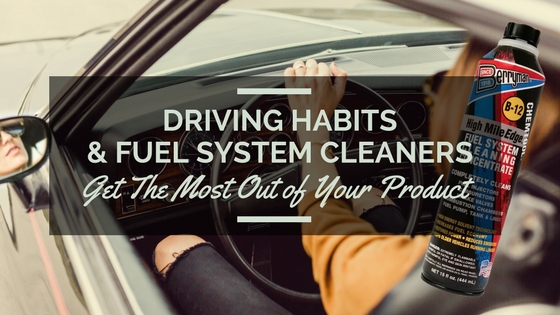Our driving habits affect a lot of processes when it comes to how our vehicles perform. Driving too fast or erratically negatively impacts fuel efficiency. Running your vehicle and a higher RPM than it is designed for puts undue strain on the transmission and clutch. But what about when it comes to fuel additives? Does driving style affect how well these products work? The short answer is, ‘yes.’ Read on to learn why, and how you should drive to see the best results with your product.
How Does Driving Style Affect B-12 Chemtool Fuel System Cleaner’s Efficiency?
Your driving style and type of trip may impact the overall ability of the product to clean your fuel system. A good rule of thumb regarding fuel additives in general is that they perform best during extended periods of driving. A highway based road trip is ideal, but running at high RPM’s is not necessary.
How Long Does The Product Last and Stay Effective After Being Added To The Fuel Tank?
Berryman B-12 Chemtool Fuel System Cleaner should remain effective until fully consumed in modern automobiles. In most marine applications, it is best practice to add it the day it is going to be used.
Is Berryman B-12 Chemtool more effective when used up within days, weeks or months and what are the most important factors at play?
You may imagine that some factors would be continuous engine running time and speed, or frequency of acceleration and deceleration. The most important factor with fuel additives is the amount of time the vehicle runs. The longer it runs, the more continuous the contact time the chemical has with the deposits, and, therefore, the more thorough the level of cleaning. Highway driving is expected to afford slightly better cleaning than start-and-stop driving, which is better still than simply idling. Short trips are the least effective. Both the degree of buildup within the tank and the nature of the deposits (i.e. gum vs. varnish vs. carbon) influences the cleaning process. Further, the location of the buildup (i.e. injector tip, intake valve, piston crown, etc.) is a factor as well.
Does idling through an entire tank afford more thorough cleaning than highway or start-and-stop driving due to the engine running longer overall?
Contact time is just one of the relevant factors. Operating temperature is also important as some classes of chemicals require heat for activation (including PIBSA-based detergents). Also, some components – catalytic converters, for instance – perform better under a load as opposed to an idle.
There is rarely a perfect scenario in the field when it comes to fuel system cleaners and driving habits. However, highway driving is generally the best fit scenario when taking into account all of the relevant parameters.
At Berryman Products, we are committed to providing you with the best performing products and the best customer service. Ready, willing and able to answer any and all product and performance-related questions. Contact us today, or visit our solution center for more answers.

